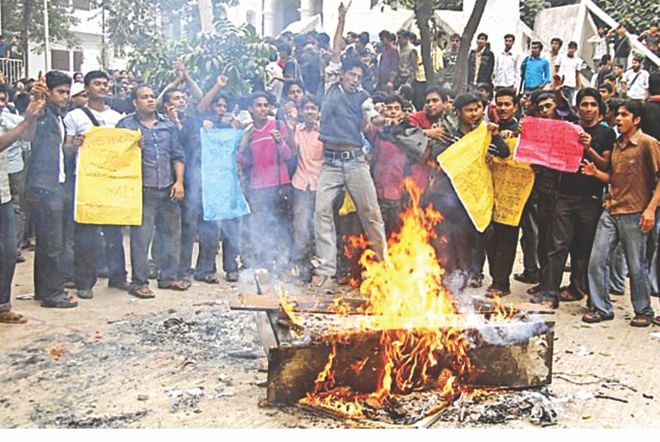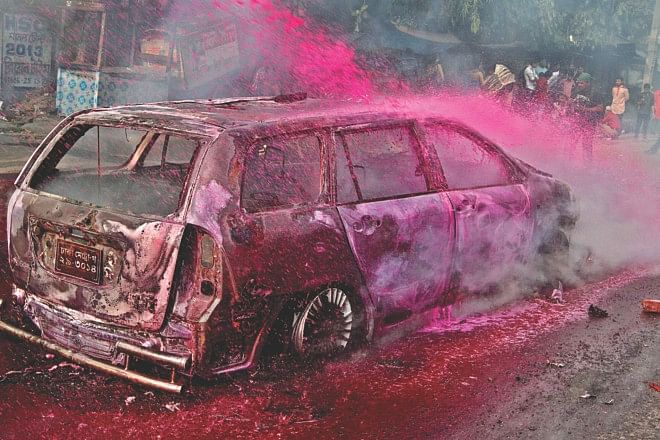Combating terrorism: Needs phlegmatic response

If the only tool you have is a hammer, all problems begin to look like nails.”
We should keep the wise words articulated in the quotation of Maslow, the famous US psychologist, in mind when we are addressing any problem, more so when it has to do with an issue like terrorism, particularly ones that are motivated by religious ideology.
While terrorism is considered a tool of the weak against a stronger and oppressive force where it is adopted to balance the scale of force, each country that is faced with the phenomenon must realise that terrorism takes roots due to reasons that are germane to that particular country and the response must evolve keeping in mind the dynamics that have caused it to germinate in the first place.
A problem in countering terrorism is the lack of understanding of the phenomenon itself. The propensity to see terrorism as merely a law and order issue leads the state towards adopting the apparently easier option of force with the hope that it would be a short sharp affair. No insurgency movement or terrorist group has ever been neutralised by means of force alone. The cause of the rise of terrorism in that particular country must be addressed simultaneously to defeat the raison d'être of their existence. It is also important to determine whether terrorism is the cause of a particular conflict or the conflict has festered terrorism.
Our predilection for anti-terror action only, rather than a more comprehensive strategy of counter terror, which, admittedly, is time consuming but in the long run more efficacious in defeating the phenomena, has been caused by the seemingly easy success of the state in the late seventies in combating the leftist extremists. And that, if anything, highlights the essential difference between terrorists motivated by religious ideology and those that are imbued with political philosophy. Their ultimate objective, which is to gain political power or establish a political dispensation of a particular ilk, is the same. However, as events have proved, in our case in particular, political extremism has not survived the test of time either due to lack of conviction of purpose or lack of popular support. Religious extremism or terrorism on the other hand is a more recent phenomenon for us. But as scholars in the field of terrorism aver, to be successful against the religious terrorists, it is their flaunted philosophy, that exploits religion by misinterpreting it, is what must be targeted.
It will be well to remember that those that are pursuing the path of terrorism take on the mantle of saviour of the oppressed as indeed we have seen happen in many countries, where the tools of terrorism were adopted as a defensive mechanism. That then became a tactical expedient in the overall political strategy of a revolutionary group seeking resolution of a political issue.
Terrorism can also be used as a strategic expedient where the political objective is sought to be gained through the application of terrorism and terror tactics alone. And in this case too the terrorist groups become the representative of the weaker but the majority segment of the society suffering the oppression of a minority having the command of the state's law enforcing agencies and its coercive elements. The two classic examples of such a group are the Irgun which waged terrorist activities against the British. It is the only organisation responsible for the birth of a country, Israel, through terrorism alone. The other group which adopted the same philosophy has settled for softer options for the realisation of a separate Palestinian homeland.
While for many years during the eighties and nineties that saw many regions of the world engaged in grappling with the scourge of terrorism, including several countries in South Asia, Bangladesh was relatively free from it.
Much of what has appeared today in the form of the activities of indigenous terrorist groups have to do with the anti-Soviet war in Afghanistan where “Jihad” became a much vaunted term and in which youths from many Muslim countries, including Bangladesh, were not only encouraged to participate but were almost deified for doing so. After the Soviets were pushed out of that country, the returnees were motivated and inspired to replicate Afghanistan in their own countries by the al-Qaeda leader. And Bangladesh had its fair share of the youths who had participated in the Afghan war, who returned home with a different motivation. The only problem was that Bangladesh is not Afghanistan, and much as these or any other groups try, Bangladesh can never be turned into one. One of the reasons among many why this country cannot be taken over by radicals bigots is that unlike Afghanistan we are a nation, and had been so long before we got a country
However, there have been attempts in the past, albeit abortive, and there will be also many in the future, by the religious extremist groups to make their presence felt and to propagate their cause. And they will do so by perpetrating violence primarily to demonstrate the weakness of the government and the state to provide security to the citizens.

It was in 2005 August that Bangladesh for the first time was exposed to the reality that there were indeed religious extremists that commanded a fair degree of expertise and possessed the organisational ability to be able to carry out simultaneous explosions in more than 400 locations in the country. While it is not the purpose of the paper to delve into the prospect of their success in fulfilling their agenda, or how much they have succeeded in their motivational effort to sway people to their cause, it will be well to assume that these groups are motivated enough to pose serious threats to the country's stability and unless we address the issue in its entirety, involving everyone cutting across party lines, and as long as the issue is used as a political expedient to upstage political opponents, the religious extremists will use the flux to make political space for their propaganda and terrorist activities.
Unfortunately, the matter was brushed aside, when we were first exposed to it in 2005, by the government which was not even willing to accept that we had a problem at hand. And there is ground to believe that these extremists, particularly those belonging to HUJ(I) and JMJ(B) had truck with the Jamaat, many of them had belonged to its cadre before going underground. While the policy of denial has been counterproductive overstating the threat can be counterproductive too. Either situation precludes objective assessment of threat; the result is inadequate or inappropriate response.
While the BNP regime in 2005-06 was forced into proactive measures to apprehend the extremists and bring them before law, the current regime has been successful in anticipating the extremists' activities by apprehending large number of these cadres. In fact, after August 17, 2005, one cannot recall a single act of terrorism in Bangladesh. That speaks well of the anti-terror activities of the government. However, it is equally important to devise both strategy and tactics to counter the narratives of the extremists and to de-radicalise the core members of these groups and those that have been won over by them.
According to experts, it is in the more liberal pluralist societies and democracies and not the oppressive regimes and harshest dictatorships in which terrorism occurs. While recognising the fact that limits of counterterrorism is inbuilt in the structure of any democracy, it is only democratic governments that are better equipped to address the phenomenon.
We must also realise that the problem is not party specific and that it requires accord across the board to make the counter terror strategy effective and successful. And that requires not only the coordinated efforts of all the agencies of the state but also the active participation of the civil society as well as the media, working in unison to counter the extremists.
In our context the suspected link of the radicals with a political party who are a part of the opposition conglomerate makes the issue somewhat complicated. In this context there is demand from a segment of the society for banning the Jamaat. If the government has so far not banned Jamaat then that must be because of some very compelling reasons. However, one is not sure whether religious extremism would end with the banning of Jamaat only. But there is strong rationale for countering Jamaat politically and countering the extremists' narrative to expose the fallacy of their cause. And that can be done only under a well thought out counterterrorism strategy that will address the root cause.
The author is Editor Op-Ed and Defence & Strategic Affairs, The Daily Star.

 For all latest news, follow The Daily Star's Google News channel.
For all latest news, follow The Daily Star's Google News channel. 



Comments